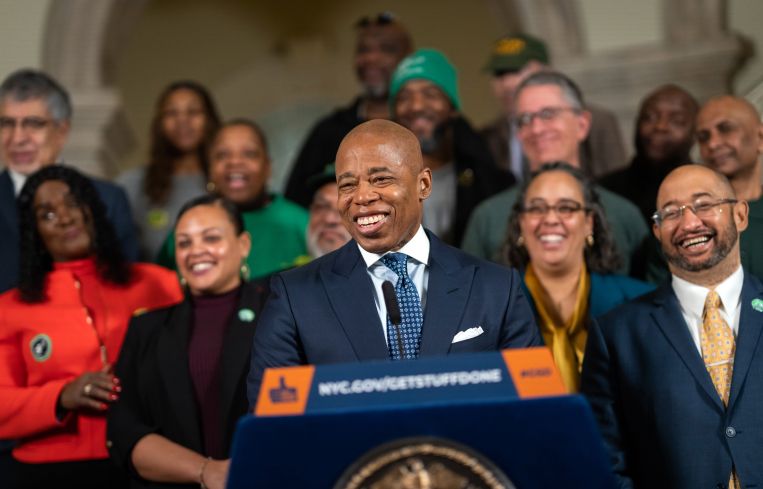New York City Council Gives Final Nod to Adams’s City of Yes
By Mark Hallum December 5, 2024 5:08 pm
reprints
The New York City Council gave Mayor Eric Adams’s sweeping plan to overhaul the city’s zoning in an effort to boost housing production the seal of approval Thursday, casting a majority vote in favor of the City of Yes.
Known officially as the City of Yes for Housing Opportunity, the legislation is expected to produce around 80,000 new housing units over 15 years with a variety of zoning changes which were approved by a vote of 31 to 20. But Adams was only able to secure approval after the council made several changes to the plan, including scrapping part of the proposal to eliminate parking requirements for new developments across the board.
“Our modifications prioritized creating the greatest number of homes while maintaining the fair housing principle that every neighborhood contributes in a plan that could be approved,” Council Speaker Adrienne Adams said in a press conference before the vote. “This council has led efforts to make housing more affordable, especially at the deepest levels needed by most New Yorkers.”
Adams first pitched the proposal to overhaul the city’s outdated zoning measures in 2022, and solidified the plans in April. While it passed through the Department of City Planning relatively unscathed, it faced changes when going through two council subcommittees last month and via the Adams administration promising to provide $5 billion towards the construction of affordable homeownership programs and infrastructure repairs to win the council’s support.
While the Thursday vote was still close, with Staten Island and Queens lawmakers pushing back on the proposal, real estate leaders were supportive of the measure.
“We are the city of no and that’s why we needed a program called the City of Yes,” MAG Partners CEO MaryAnne Gilmartin said during a New York University panel on Thursday. “It’s catalytic to what needs to happen in this city to provide 50,000 new units of housing per year … It’s going to create housing at a much faster pace”
During the same event, Bill Rudin said the urban planning scheme would “open up a floodgate of conversions.”
The adoption of the bill follows the City Council’s Land Use Committee and its Subcommittee on Zoning and Franchises approval of a version of the proposal in late November, which kept parking requirements for new buildings in some districts while exempting some single-family neighborhoods and tweaking the allowances for accessory dwelling units (ADU).
City Planning backed those changes on Monday with the commission and agency chairman Dan Garodnick finding that those adjustments fell into line with the pre-existing environmental review for the City of Yes.
“When you consider that all of the component parts of the proposal are still in the proposal, it is a very meaningful result when talking about a little bit more housing in every neighborhood, and there is a route for every neighborhood to participate in this plan, even with the council’s amendments,” Garodnick said on Monday about the City Council revisions. “So that, to me, is very much what we hoped to achieve, and we feel really good about it.”
Some of the changes on a more granular level were outer-borough concessions, which included allowing for 80,000 units instead of the original 100,000 and exempting communities zoned lower-density R1-2A, R2A and R3A from taking on additional development. The deal also hinged on the administrations of Adams and Gov. Kathy Hochul investing $5 billion toward the construction of homes, affordable homeownership programs and infrastructure upgrades.
For ADUs to be deemed legal, the home must be owner-occupied and basement apartments cannot be located in a flood-prone area. They will also need separate utilities and fire safety measures approved by the city.
Parking requirements will be dashed only in areas with mass transit access.
Despite the changes, Adams praised the passing of the bill, calling it a “historic day in New York City.”
“We showed the nation that government can still be bold and brave by passing the most pro-housing piece of legislation in city history,” Adams said in a statement. “Our administration proposed and fought hard for this proposal for more than a year, and now New Yorkers are the ones who will benefit from lower rent.”
— With additional reporting by Isabelle Durso.
Mark Hallum can be reached at mhallum@commercialobserver.com.



